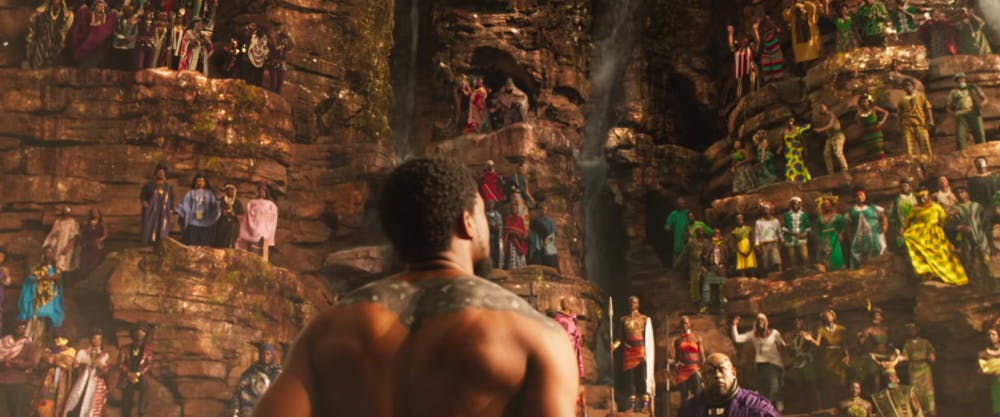What is darkly interesting about diverse casts onscreen is that they very rarely get to have diverse stories. It’s true that Hollywood has made incremental steps to address racial type–casting, white–washing and underrepresentation in film, all while growing ever–cognizant of the box office strength of diversely casted movies. But industry efforts at rectifying its glaring imbalance seem paltry in the face of the record–smashing arrival of Marvel’s latest stand–alone superhero blockbuster, Black Panther.
Black Panther, which debuted to raucous praise this weekend, is an origin story of sorts for King T’Challa, played with quiet strength by Chadwick Boseman. In the Ryan Coogler directed film, T’Challa is the newest king of the fictional African nation of Wakanda, and newest member to the previously all–white Avengers cast. Since Friday, the film has already been tagged as the ‘wokest’ and ‘realest’ Marvel film to date, with fans planning return visits within the same weekend. Stacked with a heavy–weight crew including Angela Bassett, Michael B. Jordan, Danai Gurira, Lupita Nyong’o, and Forest Whitaker, Black Panther seems to have been destined for success. The fact that breakout star Letitia Wright, who plays King T’Challa’s younger sister and master inventor Shuri, quips quotables and steals nearly every scene is only the icing on an multi–layered cake. In terms of the Marvel Cinematic Universe, it’s a great movie to follow director Taika Waititi’s technicolor dream realized in Thor: Ragnarok. But across comic–book lines, Black Panther has thrummed up in unprecedented magnitude the kind of excitement for a non-cis, white male superhero that we haven’t seen since DC’s Wonder Woman of last year. It seems the revolution Black Panther’s extensive promotional campaign promised has arrived—and luckily for us, it brought gifts.
The first is a whole new world. Wakanda is an afro–futurist delight and while there’s no way to do it justice in words, this centerpiece glistens as much as it gives. The vibranium ore beneath its soil invigorates a city that would make fellow Avenger, Tony Stark drool at the possibilities. Though afro–futurism belies a sort of misnomer for the African nation, what is so exceptional about Wakanda is that it’s a city of the future, realized right now. It is precisely this fusion of timelines, and the thematic straddling of history, futurism and contemporary discussions of race and gender that will pose some of the film’s greatest conflicts as well as lend its greatest strengths.
Because we are living in a moment when predominantly Black nations have been deemed “shithole countries” by the president of the United States, this film’s celebration African–isms in culture, clothing, spirit and speech carry even greater weight than anticipated. Talking about his previous roles, main–star Chadwick Boseman stated “We’re not remembering breaking the color barrier [42], or creating funk [Get On Up]. We’re living this.” Black Panther may depict a fictional character from a semi–fictional universe, but we are living that moment of cinematic, seismic impact today. In Africana Professor Salamishah Tillet’s own words, “Black Panther is as much an alternative to our contemporary racial discourse as it is a throwback—not only a desire for what could have been, but also a nostalgia for what we once had.”
It’s true that director Ryan Coogler’s Black Panther contains slightness of hands, clicks of the tongue, and moments which are essentially winks at the camera that only African Diasporic movie–goers may catch, but this film necessarily also speaks with words for the whole world. As Professor Tillet puts it, “the film mixes genre—action film, comic book movie, fantasy, and history—to entertain and educate the viewer all at once. By doing so, Black Panther engages some really complicated debates about race, gender, dispossession, and African diaspora while also drawing a range of emotions from the audience, including comedic relief.” Within its 135–minutes runtime, viewers watch characters sharing choice words and searing indictments for each other that threaten our own opinions. Even the film’s comedy often works to destabilize scenes completely, leaving us nervously giggling at the prospect of what will come next. Most importantly, the language of Black Panther indicts the politically complicit, both onscreen and in their reclining IMAX seats, so explicitly that no one can leave the theater wondering “Is this my story, too?”
Black Panther is revolutionary. Every shot at minimum reframes and rejects an old, rusty gaze of Africa, upheld by people of color and Western viewers alike. But Black Panther also represents a revolution in the kinds of stories we are not only allowed, but well–equipped to tell for all audiences. In a time of disbelief about the power of stories championed by people of color, especially where people of color play their own champions, Black Panther has planted unshakeable roots. This movie is an experience in adventure that borders on sensory overload, just as a superhero blockbuster should be, but it also carries a proud superhero tradition of creatively interrogating our society’s institutions and ills, of which Professor Tillet says: “Wakanda is not real, and historically, there is no black nation untouched by European colonialism or racism, even Ethiopia. But there are countries, like ours and several in Europe, that are vast in wealth, military strength, and technological advancement that could end poverty and feed the world many times over. That seems to the biggest indictment: how can they have so much and share so little?" Additionally, by its very premise, Black Panther asks of our own world what Africa would be like if it had power over the resources the West has historically leeched out of the continent.
The film answers with a beautiful, resounding obviousness: it’d still be super black.







